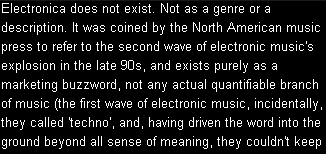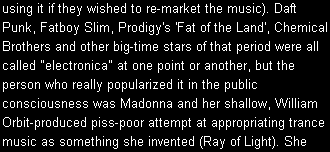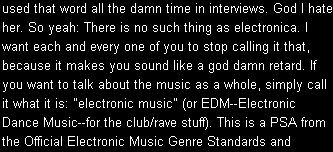Two interesting discussions of electronic music:
Kim Cascone on glitch music
Kelefa Sanneh vs Ben Neill on Moby [via NEWSgrist]
Both talk about music as "post-" something--Cascone uses the term "post-digital" and Sanneh/Neill hash out the meaning of Francis Fukuyama's "end of history" in the pop music context. Also, both use the dreaded term "electronica." Yes, it's just shorthand but it still violates a major tenet of Ishkur's Guide (now in version 2.5!):


...um, Classifications Consortium.
This quote from Neill is especially good:With design superseding art, art appropriates the commercial because otherwise it feels obsolete, and art changes from a product industry to a service industry. Dematerializing, if you will. Is that bad? Is that why we have “the end of music”? I think it’s more because in today’s sensational story-driven world, how can something as mental as “Music” (especially instrumental music, which is nearly impossible to write about and therefore to sell) compete with gang wars between rappers and Michael Jackson’s sex scandals? He's defending Moby as a symptom of something good that almost happened in pop music in the '90s (anonymity, decentralization, no more friggin rock stars). Sanneh is somewhat knowledgeable (but snide) about the "paradigm shift" electronic dance music almost pulled off back then, but is still attached to the "great man" view of history--and the paradigm of newspapers needing stories on said friggin rock stars--and thus gives Moby disproportionate credit (on the up-side of his career) and blame (on the down) as a "shifter."
|
Two interesting discussions of electronic music:
Kim Cascone on glitch music
Kelefa Sanneh vs Ben Neill on Moby [via NEWSgrist]
Both talk about music as "post-" something--Cascone uses the term "post-digital" and Sanneh/Neill hash out the meaning of Francis Fukuyama's "end of history" in the pop music context. Also, both use the dreaded term "electronica." Yes, it's just shorthand but it still violates a major tenet of Ishkur's Guide (now in version 2.5!):This quote from Neill is especially good:He's defending Moby as a symptom of something good that almost happened in pop music in the '90s (anonymity, decentralization, no more friggin rock stars). Sanneh is somewhat knowledgeable (but snide) about the "paradigm shift" electronic dance music almost pulled off back then, but is still attached to the "great man" view of history--and the paradigm of newspapers needing stories on said friggin rock stars--and thus gives Moby disproportionate credit (on the up-side of his career) and blame (on the down) as a "shifter."
- tom moody 4-06-2005 10:57 am